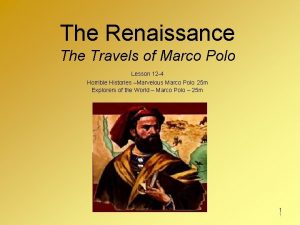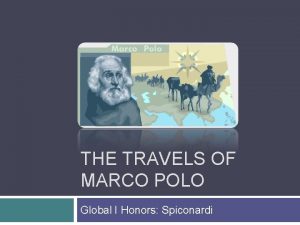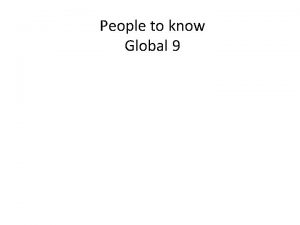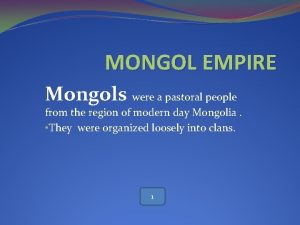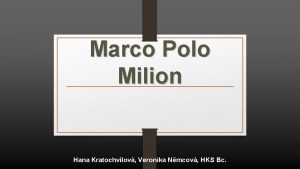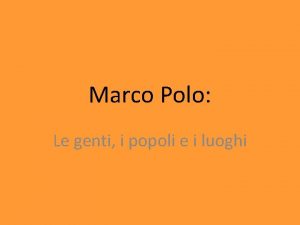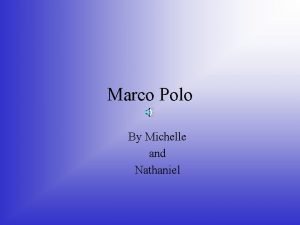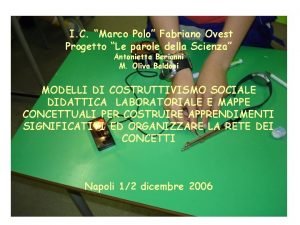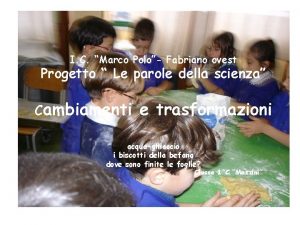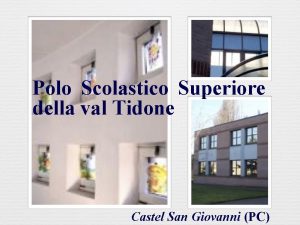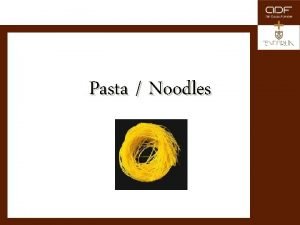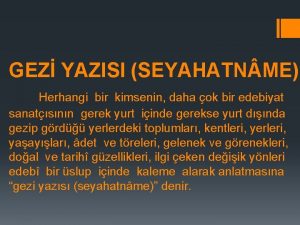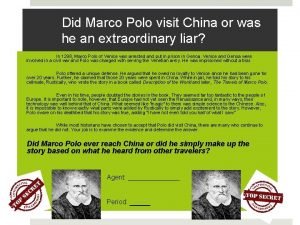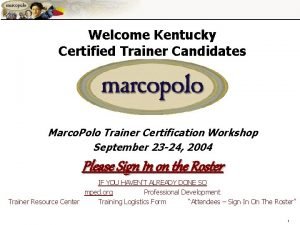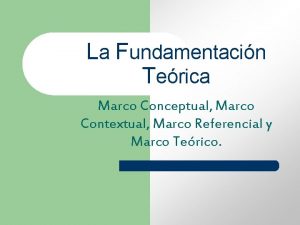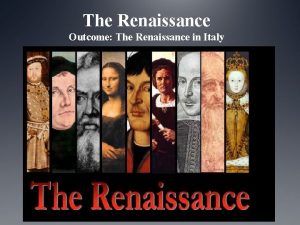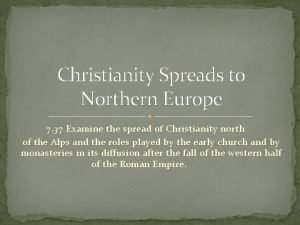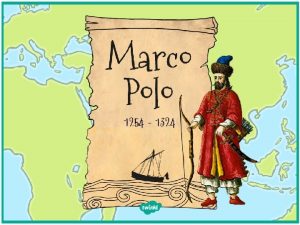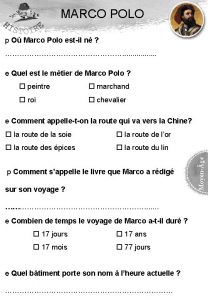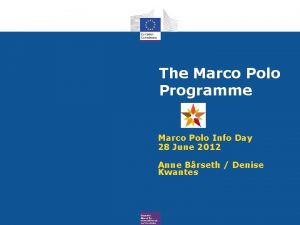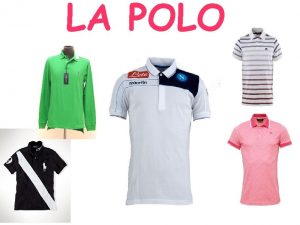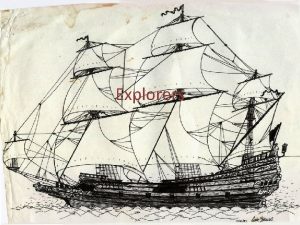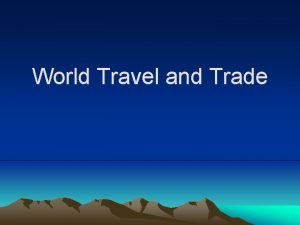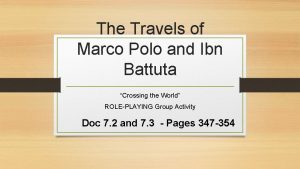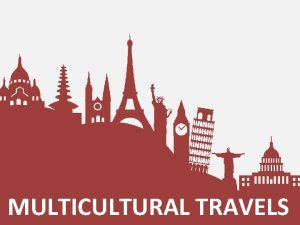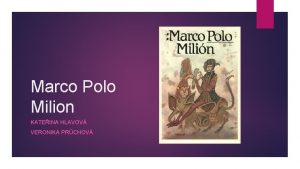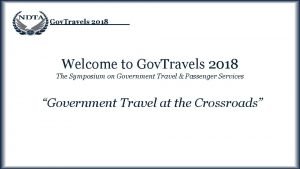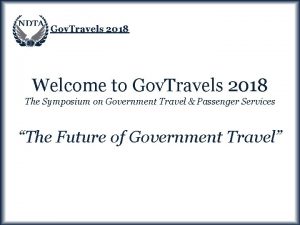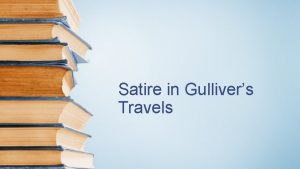The Renaissance The Travels of Marco Polo Lesson

















- Slides: 17

The Renaissance The Travels of Marco Polo Lesson 12 -4 Horrible Histories –Marvelous Marco Polo 25 m Explorers of the World – Marco Polo – 25 m 1 1

• TN SPI – 6. 6. 2 Recognize the impact of individuals on world history – Marco Polo – 6. 6. 1 Identify examples of groups impacting world history – 6. 5. 13 Identify the impact of advances in technology on history (exploration during the 1400 s) – 6. 2. 2 Identify major trade routes – Silk Road 2

Marco – The Storyteller • He often told of adventures to faraway places such as China. • Marco had traveled to China and the Indies; the islands off the China coast. • He told stories about meeting Kublai Khan, China’s ruler, and seeing amazing things – white bears, black stones that burned, and a place where night lasted all winter and day lasted all summer. 3

“Marco Millions” • People in his hometown of Venice, Italy laughed and called him Marco Millions because he told so many tales. • Few Europeans had ever been to Asia, so they could not prove Marco was wrong. • They thought his stories could not be true but many were. 4

Marco’s Travels • Marco left his home in Venice, Italy in 1271 with his father Niccolo and his uncle Maffeo. • They were caravan traders who traveled the Silk Road and were interested in the riches of the east. • Four years after beginning their journey, the Polos reached China. 5

6

Trade Routes to the East • Europeans carried on a busy trade with the people of Asia. • Europeans wanted: gold, jewels, silk, perfumes, furs, jade, ivory, and especially spices. (pepper, cloves, cinnamon, and nutmeg) • They used the spices to make their food taste better and to hide the bad taste of spoiled meat. 7

Silk Road • About 4, 000 miles long, the Silk Road was a series of trade routes connecting the east to the west. (Asia to Europe) • The trade route was traveled by caravan traders and bandits who made travel much more dangerous. • The Silk Road was physically difficult for travel. • Caravans needed their own defense forces so forts and walls were built along the Silk Road for protection. 8

9

Genghis Khan • When Genghis Khan unified the region as the Mongolian Empire, the Silk Road became an important path for communication. • Travel across the Silk Road was safe for a time under Mongol control. • Cultural diffusion - The movement of customs and ideas from one culture to another. 10

Marco’s Adventures • Marco’s father introduced his son to China’s ruler, Kublai Khan. • Kublai Khan asked Marco to explore his kingdom. • Marco spent twenty-four years working for the Khan. • Marco Polo returned home with his pockets full of jewels. 11

Kublai Khan • Kublai Khan was China’s Mongol ruler. • Marco described his palace as having walls covered with gold and silver. • One hall was so big that “a meal might be served for more than 6, 000 men. ” 12

The Travels of Marco Polo • Upon returning to Venice, Marco became the captain of a Venetian ship. • Venice and Genoa, two Italian city-states, were involved in battle. • Marco was captured and thrown into prison. • While there his stories were written down. • Two hundred years later, The Travels of Marco Polo was published. 13

Trade Routes to the East • For most European traders travel to Asia and back was too hard and took too much time. • In 1453 trade with the Far East was stopped by Muslim Turks after they captured the city of Constantinople. • A new trade route to China would have to be found. 14

A New Trade Route? • Kingdoms in Europe began to explore the possibility of a water route to Asia. • They were not willing to give up the luxury goods they had become accustomed to. • Portugal was the first to search for a faster water route to China by sailing around Africa. 15

Reasons for Exploration • It was long before Spain, England, and Italy joined Portugal in the search of new lands. • Why? Claiming new lands would: – Increase their territory – establish colonies – Increase their wealth – trade goods – Spread their religion- Christianity 16

17
 Where was marco polo born and raised
Where was marco polo born and raised Marco polo lesson
Marco polo lesson Marco polo global
Marco polo global Maurya accomplishments
Maurya accomplishments Pastoral people from the region of modern day mongolia
Pastoral people from the region of modern day mongolia Marco polo milion
Marco polo milion Viaggio di marco polo in cina
Viaggio di marco polo in cina When was marco polo born and when did he die
When was marco polo born and when did he die Istituto comprensivo marco polo fabriano
Istituto comprensivo marco polo fabriano Marco polo fabriano
Marco polo fabriano Polo scolastico valtidone
Polo scolastico valtidone Marco polo pasta myth
Marco polo pasta myth Gezi yazısı marco polo
Gezi yazısı marco polo Marco polo liar
Marco polo liar Marco polo yahoo
Marco polo yahoo Diferencias entre marco conceptual y marco teorico
Diferencias entre marco conceptual y marco teorico Cosimo de' medici
Cosimo de' medici Italian renaissance vs northern renaissance venn diagram
Italian renaissance vs northern renaissance venn diagram

